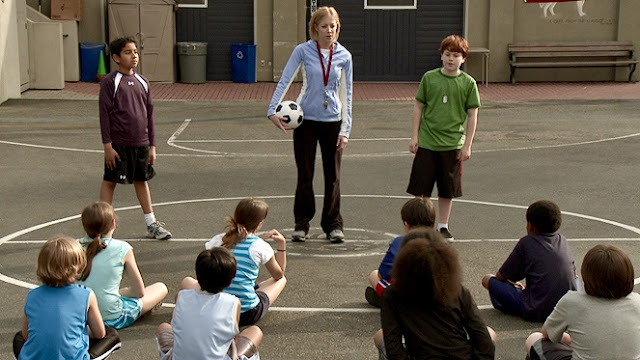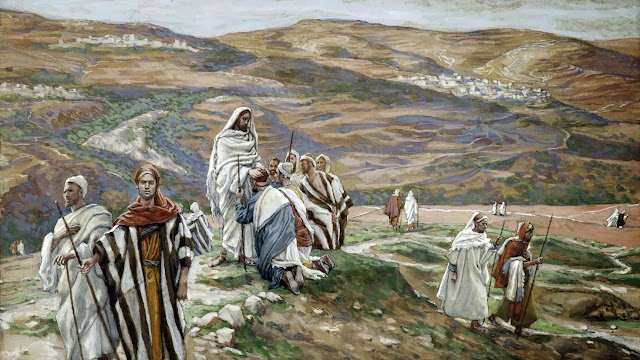Sixteenth Sunday in Ordinary Time B
What were you doing 50 years ago? In 1968, the Vietnam War was raging—as was opposition to it. The Beetles released their “white album,” and Led Zeppelin made its U.S. debut. Other debuts included 60 Minutes, the Special Olympics, and Boeing’s 747 jumbo jet. Yale admitted its first female students. Martin Luther King Jr. was assassinated, as was Robert F. Kennedy. Richard Nixon won the White House. Apollo 8 was the first manned spacecraft to orbit the moon. The Green Bay Packers won the Super Bowl, and the Detroit Tigers won the World Series.
And in the middle of it all, on July 25, 1968—50 years ago this week—Pope Paul VI released his encyclical letter Humanae Vitae (On Human Life), outlining the Church’s position on artificial birth control. It would prove to be one of the most controversial documents in the modern history of the Catholic Church. And that’s strange, really, since it only reaffirmed what the Church had always taught: that there is an intimate, intrinsic bond between sex and marriage because they share the very same purposes: the lifelong, faithful union of husband and wife, and the procreation and education of children. By God’s design, these purposes are not to be separated. This teaching was unanimous among all Christians—despite their many other divisions—until the early 20thcentury.
With the western world in the throes of the sexual revolution, many folks were expecting some change to be announced by Paul VI. But since this teaching was firmly grounded in the Church’s constant doctrine from earliest times, the words of Scripture, and in the very way God put human beings together, the Pope didn’t so much say that he wouldn’t be changing anything, but that he couldn’t.
As the Pope confirmed the Church’s longstanding tradition, countless souls abandoned it. Today, contraception has become the norm—as common among Catholic couples as in the general population, and all-too-often with the quiet encouragement of priests and even some bishops: “We all know what the Church says, but it’s really between you and God. Do whatever seems right for you.” (Those words sound eerily similar to ones spoken by a wily serpent to a couple of newlyweds a long, long time ago.)
Pope Paul VI made some predictions in his 1968 letter—predictions of what would happen if the Church’s teaching went unheeded. He predicted an increase in marital infidelity. He predicted a general lowering of moral standards. He predicted a loss of respect for women. And he predicted government interference in citizens’ reproductive lives.
Every one of his predictions has come true.
Consider these very telling facts… Over the last 50 years the divorce rate has more than doubled; it has actually started to decrease recent, but that’s likely because so few people are now getting married in the first place. The U.S. birthrate has dropped to an all-time low; our population has grown, but only due to immigration, since we haven’t been at a replacement birthrate since 1971. Pornography has become an $100 billion industry, annually producing 20 times more movies than Hollywood; what once—quite literally—lurked about in the shadows is now today influencing everything from childhood development to presidential politics.
In an age that’s so in love with things being “all natural” and “organic,” we seem to make an exception for human reproduction, using whatever artificial means we can devise to either force God’s hand in having a baby or in avoiding one—even if that means eliminating one. This is the only field of medicine I can think of that aims to get a perfectly healthy part of the human body to stop functioning as it should. It’s so ironic that we call them “reproductive rights” when what we actually mean are the many ways we can avoid reproducing. We only want kids on our own terms. We used to see kids as such a priceless blessing; now we feel the need to calculate what they would cost us.
Of course, there’s also the significant, direct impact on the Catholic Church. In our own parish back in 1968, we had 126 weddings and 230 baptisms. This past year—50 years later—we had only 5 weddings and just 14 baptisms. It used to be that you’d see a big family and say (with a smile and a bit of pride), “They must be Catholic!” When was the last time you saw a big family—whether here in church, or anywhere? Nowadays, folks mock or look down upon parents who have many children: “Don’t they know we’ve figured out what causes that?”
Pope Paul VI taught that sex and marriage go together, because loving union and procreation go together. But over these past 50 years, we’ve watched them grow farther and farther apart, such that sex has become increasingly casual (even recreational) and deliberately sterile. It’s no wonder that every Pope since then has echoed the same concerns. Does Humanae Vitae call Catholics to act irresponsibly, and simply have as many kids as they can—even more than they can handle? Of course not. But it does call us to accept and remain open to one of the noblest responsibilities entrusted to us by God: to cooperate with him in the creation of human life.
History has shown that any human society—including the Church—that hopes to survive (leave alone to thrive), does so not because they have lots of wealth, nor because they have military might, nor because they have a highly refined culture, but simply because they have children.
So if the Pope was spot on with all of his grim predictions 50 years ago, might he also have been right about how they could be avoided and corrected?
Our readings this Sunday talk a lot about shepherds—both good and bad. Jeremiah warns against shepherds who mislead and scatter the Lord’s flock. Jesus himself sees the vast, restless crowd gathering around him and, we’re told, “his heart was moved with pity for them”; the original Greek is a good bit stronger: he was stirred in his bowels—felt punched in the gut—to see them so lost, gone so far astray, “like sheep without as shepherd.”
Sheep require vigilant shepherds. They are essentially without defense and cannot manage well on their own. Even when they’re being guided to green pastures and restful waters, they are prone to wandering off and putting themselves in danger.
So it is with sheep. So it is with us—God’s sons and daughters.
Pope Francis has said of his predecessor 50 years later—a man whom he will canonize this October, “He looked to the peoples of the world and foresaw the destruction of the family because of the lack of children. Paul VI was courageous. He was a good pastor, a good shepherd. He warned his sheep about the wolves that were approaching.”
It really all comes down to trust—to our need for an increase of faith. When God creates the first man and woman, the Lord blesses them and gives them this first commandment: “Be fertile—be fruitful—and multiply…” (Gen 1:28). Can we wholeheartedly believe that if we obey this command God will in fact provide all that we need? Do we trust God enough to let him truly shepherd us, believing that when we do, we shall not want? Can we let go of the fear that the Lord won’t come through for us, which sends us off trying to go it on our own? Do we have faith that God is still teaching, still guiding, still protecting his Church through the shepherds he has appointed for us?
If we—sheep and shepherds alike—can grow in this trust, can live with this kind of real faith, then where might we be in another 50 years?










